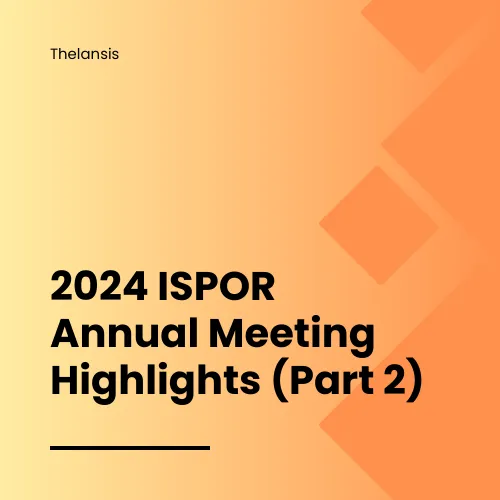
May 13 2024
/
2024 ISPOR Annual Meeting Highlights – Anticipated impact of Inflation Reduction Act (Part 2)
[vc_row css=”.vc_custom_1715260973671{margin-top: -30px !important;}”][vc_column][vc_custom_heading text=”2024 ISPOR Annual Meeting Highlights – Anticipated impact of Inflation Reduction Act (Part 2)” font_container=”tag:h2|text_align:left|line_height:1.35″ use_theme_fonts=”yes” css_animation=”fadeInUp”][/vc_column][/vc_row][vc_row css_animation=”fadeIn”][vc_column][vc_column_text]
The Inflation Reduction Act (IRA) aims to reduce Federal government spending for Medicare Part D and Part B-covered drugs by allowing the government to negotiate drug prices with the drug marketers to ensure a “maximum fair price,” potentially leading to the lower prescription drug costs for Medicare-covered patients. For the 10 high-cost drugs with the highest government spending on Medicare Part D, negotiations kicked off in early 2024, and the new prices will be effective in 2026. In addition to price negotiations, the IRA aims to implement an inflation rebate, a $2,000 out-of-pocket limit, and an insulin price cap.
Multiple research posters at the 2024 ISPOR Annual Meet, Atlanta, USA, in May 2024 were presented to elucidate the anticipated impact of IRA on patients, payers, and the pharmaceutical industry post-implementation of the Medicare Price Negotiation in years starting from 2026.
[/vc_column_text][/vc_column][/vc_row][vc_row css_animation=”appear”][vc_column][vc_column_text]
Table: List of key posters presented on the anticipated impact of IRA
| Title | Author(s) |
| Will the IRA’s Negotiation Timelines Delay Access to Drugs for Orphan Indications? | Masia N. |
| Strategic Implications for Biopharmaceuticals: Navigating the Medicare Price Negotiation Provisions of the Inflation Reduction Act | Briggs S, et al. |
| Evaluating Healthcare Costs and Demographics of Medicare Part D Beneficiaries Impacted by First Top 10 Drugs Selected for Price Negotiations Under the Inflation Reduction Act (IRA) | Varghese I, et al. |
| Assessing Cost-Savings From the Inflation Reduction Act in Louisiana Medicare Beneficiaries Due to Diabetes Medications | Winberg D, et al. |
| Impact of the Inflation Reduction Act on Payer Utilization Management – Insights from a Quantitative Survey | Saxena V, et al. |
| Inflation Reduction Act: How Will the First 10 Drugs Selected for Medicare Price Negotiations Impact US Commercial Payers? | Sidhu C, et al. |
| An Analysis of Stakeholders’ Contribution to High-WAC and Low-WAC Adalimumab Products in 2025 Under the Inflation Reduction Act in the United States | Yoo H, et al. |
[/vc_column_text][/vc_column][/vc_row][vc_row css_animation=”fadeIn”][vc_column][vc_column_text]
Key Findings:
The 10 high-cost drugs on Medicare Part D, which are under price negotiations, amounted to more than $50 billion or equaled about one-fifth of the total spending of Medicare Part D (from Jun 2022 to May 2023). The drugs include treatments for the metabolic condition diabetes, cardiovascular condition heart failure, autoimmune conditions, anticoagulants, and oncology drugs. The negotiation process to consider the selected drug’s impact on Medicare-covered patients, clinical advantage of the drug, catering any unmet need, and other considerations such as the drug development costs.
According to a research poster utilizing Medicare Part D claims data, presented by Varghese I, et al., about 8 million unique patients received at least one prescription for any of these 10 drugs in 2022 and they spent about $3.4 billion as out-of-pocket costs for these drugs in the United States. The research further highlights that beneficiaries for some of these drugs (e.g., insulin aspart, etanercept) represent a high proportion of patients with a low-income subsidy.
In another research utilizing Medicare claims data for Louisiana, presented by Winberg D, et al., cost savings were estimated for the type 2 diabetes drugs included for price negotiations in 2024 (i.e., Empagliflozin, Sitagliptin, and Dapagliflozin). It was estimated that these drugs utilize the majority of Medicare funding among the drugs for diabetes, and with the potential price decreases in the ranges of 25% to 65%, the Louisiana Medicare would save costs between $200-400 million. Notably, patients would save between $10-23 million in out-of-pocket costs.
Although IRA implementation would benefit patients utilizing Medicare drugs, commercial payers providing Medicare Part D supplemental plans and Medicare Advantage plans would experience a financial burden due to the new cost-sharing requirements, such as insurers covering 60% of drug costs in the catastrophic phase and an increased costs due to the $2,000 out-of-pocket cap. Based on the primary market research from payers from MCOs / PBMs, Saxena V, et al. reported that payers believe that due to IRA, drug marketers will likely compensate for lower revenues by lowering rebates for commercial plans. To counteract this, commercial plans would encourage lower-cost therapies such as generic / biosimilar use or utilize tighter formulary management. According to the payer research by Sidhu C, et al., commercial payers will follow the Medicare price negotiations and will likely update utilization management for the impacted drugs, and for the direct or indirect competitors of the selected drugs in similar indications.
[/vc_column_text][vc_column_text]
Conclusions: Undoubtedly, based on the research studies presented at ISPOR 2024, lower drug prices due to the ongoing negotiations under IRA will lower the patient’s out-of-pocket costs and result in improved market access for these drugs. However, pharmaceutical companies must judiciously prepare for price negotiations with not only Medicare but also with commercial payers.
[/vc_column_text][vc_column_text]
References:
- ISPOR Annual Meeting, USA, May 5-8, 2024
- Varghese I, et al. Evaluating Healthcare Costs and Demographics of Medicare Part D Beneficiaries Impacted by First Top 10 Drugs Selected for Price Negotiations Under the Inflation Reduction Act (IRA). Value in Health, Volume 27, Issue 6, S1 (June 2024)
- Winberg D, et al. Assessing Cost-Savings From the Inflation Reduction Act in Louisiana Medicare Beneficiaries Due to Diabetes Medications. Value in Health, Volume 27, Issue 6, S1 (June 2024).
- Saxena V, et al. Impact of the Inflation Reduction Act on Payer Utilization Management – Insights from a Quantitative Survey. Value in Health, Volume 27, Issue 6, S1 (June 2024)
- Sidhu C, et al. Inflation Reduction Act: How Will the First 10 Drugs Selected for Medicare Price Negotiations Impact US Commercial Payers? Value in Health, Volume 27, Issue 6, S1 (June 2024)
[/vc_column_text][/vc_column][/vc_row][vc_row css_animation=”fadeIn” css=”.vc_custom_1715261341755{margin-top: 20px !important;}”][vc_column][vc_column_text]
Thelansis’ PayerPro360: Empowering Pharma/Biotech with Robust Payer Insights. PayerPro360 is an innovative and user-friendly AI-based platform designed and developed by Thelansis Knowledge Partners to revolutionize Payer Research.
For customized payer research, please ask for a demo of our innovative research tool: PayerPro360 (https://thelansis.com/payerpro360/). Below highlighted are the features of PayerPro360:
[/vc_column_text][/vc_column][/vc_row][vc_row css=”.vc_custom_1715261349236{margin-top: 20px !important;}”][vc_column][vc_single_image image=”14616″ img_size=”large” alignment=”center” css_animation=”appear”][/vc_column][/vc_row]

